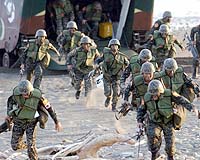| . |  |
. |
Paris (AFP) June 3, 2009 Sweden wants to examine the role of the European Union's military battle groups, which have never been deployed, when it takes over the bloc's rotating presidency in July, a Swedish diplomat said Wednesday. "On the military side, I would like to draw your attention to the use of battle groups -- a potentially very useful tool to the support of international peace and security," said Sweden's ambassador to France, Gunnar Lund, to a meeting of the Western European Union (WEU) in Paris. An EU battle group consists of 1,500 multi-national soldiers who are meant to be rapidly deployed within 10 days in a emergency event outside the EU borders, while waiting for the arrival of others troops. Two EU battle groups of 3,000 soldiers do a tour of duty every six months. "However, as you are well aware, the battle groups have not yet been used," said Lund, speaking on behalf of Sweden's foreign minister Carl Bildt. "During the Swedish presidency, we would like to initiate an open discussion about the usability and flexibility of battle groups -- without changing the battle group concept," he told the WEU, which is concerned with European defence. Stockholm, which has supported the five-nation Nordic battle group, regretted that the EU did not give the green light to sending it to Chad and the Central African Republic last year. Instead, the EU took months to disengage its forces, including 200 Swedish troops, and the necessary equipment of the EUFOR operation in the two African nations dealing with rebel attacks. EUFOR finally wrapped up in April after one year. The Nordic battle group cost Sweden more than 100 million euros (140 million dollars) in the first half of last year. The EU battle groups have not been deployed so far because the contributing countries cannot agree on participating in a specific EU operation, or because of different opinions on how to use the units. Share This Article With Planet Earth
Related Links Learn about the Superpowers of the 21st Century at SpaceWar.com Learn about nuclear weapons doctrine and defense at SpaceWar.com
 Taiwan mulls halving troops on islands near China: report
Taiwan mulls halving troops on islands near China: reportTaipei (AFP) June 3, 2009 Taiwan is planning to halve the number of troops deployed on three island groups near China, a report said Wednesday, amid easing tensions between the once bitter rivals. The military is considering reducing the number of soldiers stationed on the Kinmen, Matsu and Penghu islands to fewer than 10,000, the Liberty Times said, citing unnamed top military officials. The move is aimed at ... read more |
|
| The content herein, unless otherwise known to be public domain, are Copyright 1995-2009 - SpaceDaily. AFP and UPI Wire Stories are copyright Agence France-Presse and United Press International. ESA Portal Reports are copyright European Space Agency. All NASA sourced material is public domain. Additional copyrights may apply in whole or part to other bona fide parties. Advertising does not imply endorsement,agreement or approval of any opinions, statements or information provided by SpaceDaily on any Web page published or hosted by SpaceDaily. Privacy Statement |